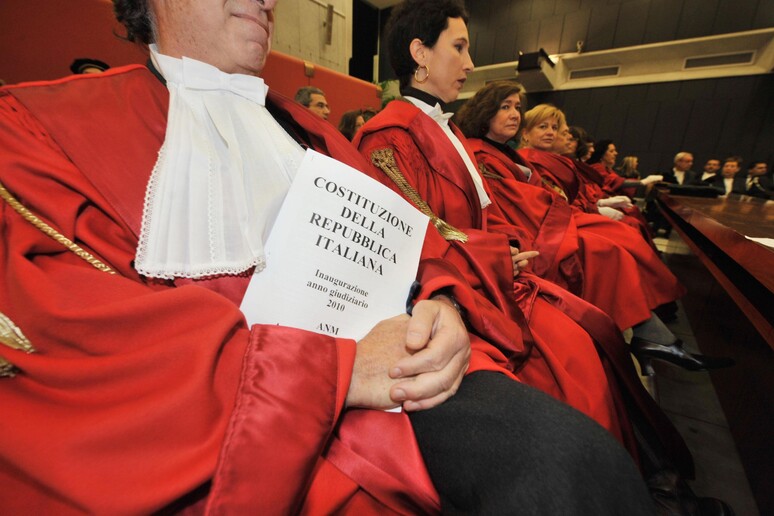Italian magistrates will strike on
February 27 against a planned government reform to separate the
career paths of judges and prosecutors so they can no longer
switch between the two, magistrates union ANM decided Saturday
night.
On that day, the start of the judicial year in Italy, the ANM
said it will ask its members to leave the hall when Justice
Minister Carlo Nordio inaugurates proceedings.
They will also don a tricolour cockade and display placards
bearing excepts from the Italian Constitution which underline
why the controversial reform is, in their view, a breach of the
founding charter which stresses the independence of the
judiciary in Italy's balance of powers with the executive and
parliamentary branches.
The ANM says the reform will undermine judicial independence but
Nordio has said that in fact if will boost it by breaking the
"pathological" hold of factions on the two interlocking groups
of judges and prosecutors in Italy's highly politicised judicial
world.
Explaining the protest, ANM President Giuseppe Santalucia in his
last executive meeting as head said there was no desire for
"rebellion" by the magistrates but simply the wish to explain
their opposition to the reform plans, which require changes to
the Italian Constitution.
"I don't like the word protest," he told the ANM's ruling bpody.
"I prefer the word proposal. But unfortunately here there are no
proposed amendments that make the text constitutionally
digestible.
"It is a text that should be totally eliminated".
Then he assured: "There is no form of illegal or institutionally
incompatible rebellion, but it is a matter of making clear to
citizens - and the day of the inauguration of the judicial year
is a very important day - the reasons why we believe that the
constitutional design does not go in the direction of improving
justice and strengthening guarantees of independence and
autonomy".
The magistrates, he maintained, have the "duty to say so".
His words did nothing to weaken the clash with the political
centre right.
"Today's is only the latest of the countless outcries of the
ANM, which systematically terrorizes public opinion against the
choices of Parliament" attacked Enrico Costa, a centre-right
post Berlusconi Forza Italia (FI) MP who spoke of "a film
already seen many times" and of "factions of the ANM that lash
out against the decisions of Parliament to defend their
corporate interests and not to lose the power accumulated over
the years".
Nordio, for his part, said when the reform took a key step
forward in parliament last week that it will foster the
independence of the judiciary and not hinder it, as alleged by
its opponents, including the Italian centre left.
"The mother of all reforms, which is the separation of careers,
and especially the institution of the High Court of Justice, and
the drawing of magistrates will have a series of positive
consequences for the judiciary itself", said Nordio, a
heavyweight in Premier Giorgia Meloni's right-wing Brothers of
Italy (FdI) party.
The bill also creates a high court to discipline members of the
judiciary and changes the make-up of the judiciary's
self-governing body, the CSM, overhauling the way CSM justices
are elected, using a draw process.
"The judiciary today is independent from the executive power,
and it must be and will remain so but it is not independent from
itself at all", said Nordio, adding that members of the
judiciary depend on factions within the ANM, that "keep them
under protection".
Nordio said the reform will "break this pathological connection
that unites the voter and the elected" in the CSM, "which finds
its most pathological manifestation in the disciplinary branch".
The Lower House on Thursday gave the first green light to the
Constitutional reform bill.
It needs another vote in the House and two in the Senate before
final approval and could be subjected to a popular referendum.
Tommaso Calderone, another MP of Fi, created by late three-time
premier and media mogul Silvio Berlusconi, said its founder's
"dream is coming true after 35 years".
"It is not a reform written against someone, but to have a
fairer justice (system)", said FI leader Antonio Tajani, the
deputy premier and foreign minister.
Specifically, the constitutional reform bill would create two
distinct self-governing bodies of the judiciary, one for judges
and another for prosecutors.
Both would be chaired by the head of State, President Sergio
Mattarella at the moment.
Members would be selected using a draw process: one-third of
members would include university professors and lawyers from a
list compiled by members of Parliament while the other two
thirds
would be judges and prosecutors.
The High Court would discipline both judges and State attorneys.
After the three remaining parliamentary votes, an additional one
in the Lower House and two in the Senate, the reform can be
subjected to a referendum unless the draft text is approved by
at least two-thirds of members of both Houses in the second
vote.
ALL RIGHTS RESERVED © Copyright ANSA











